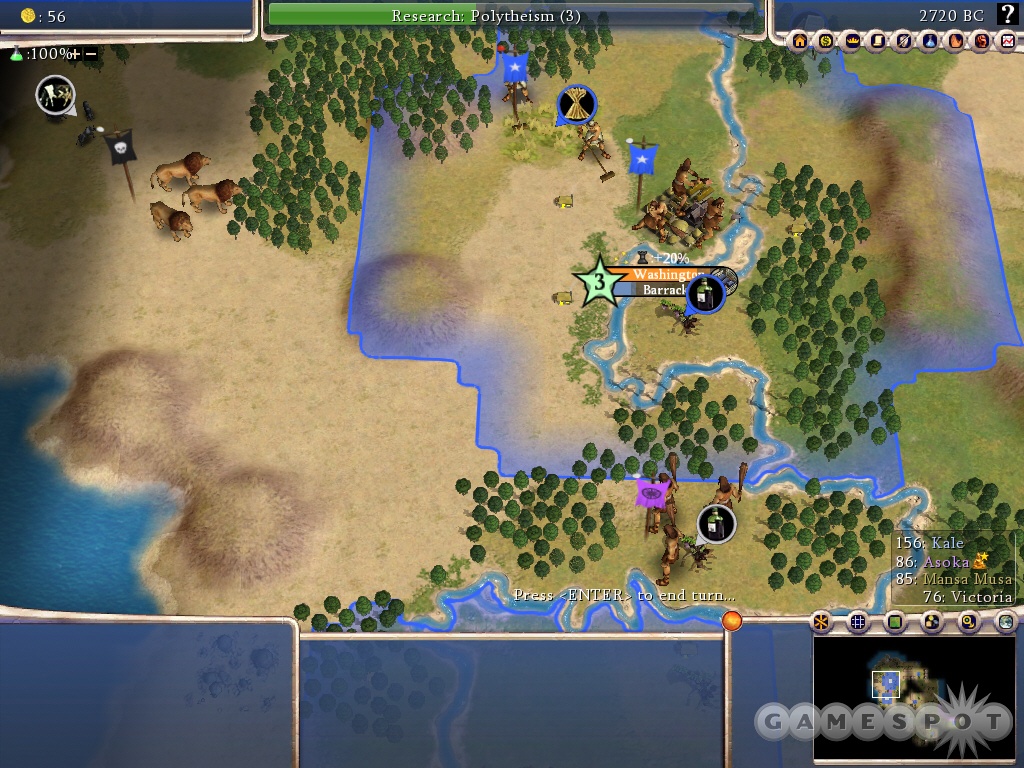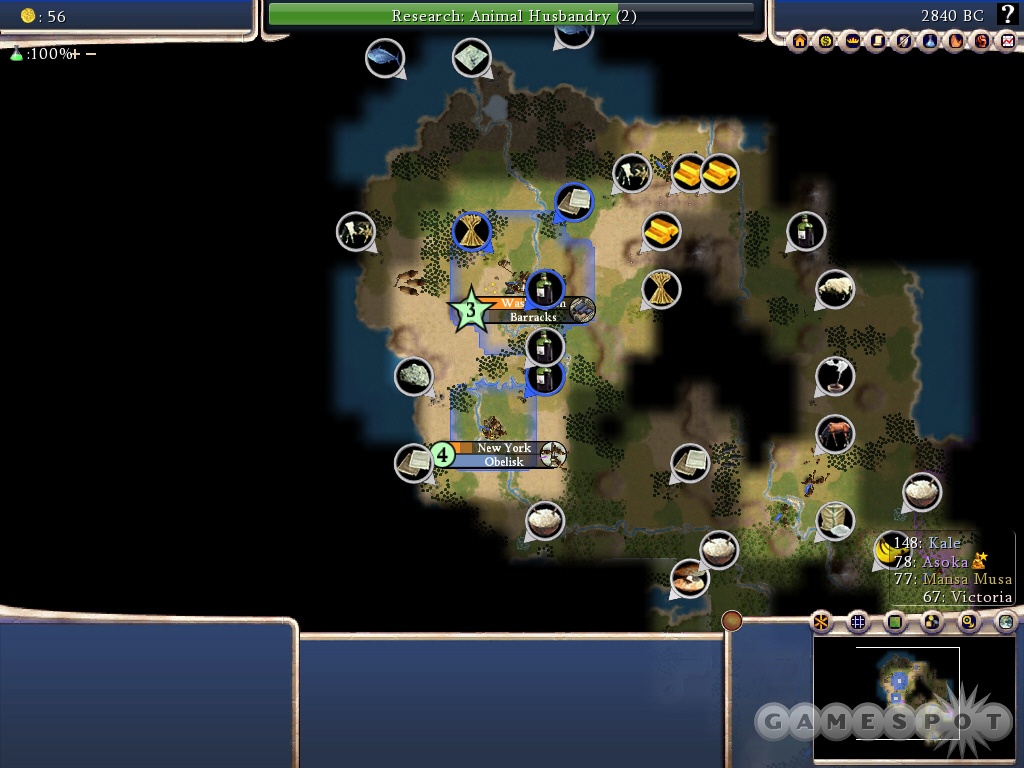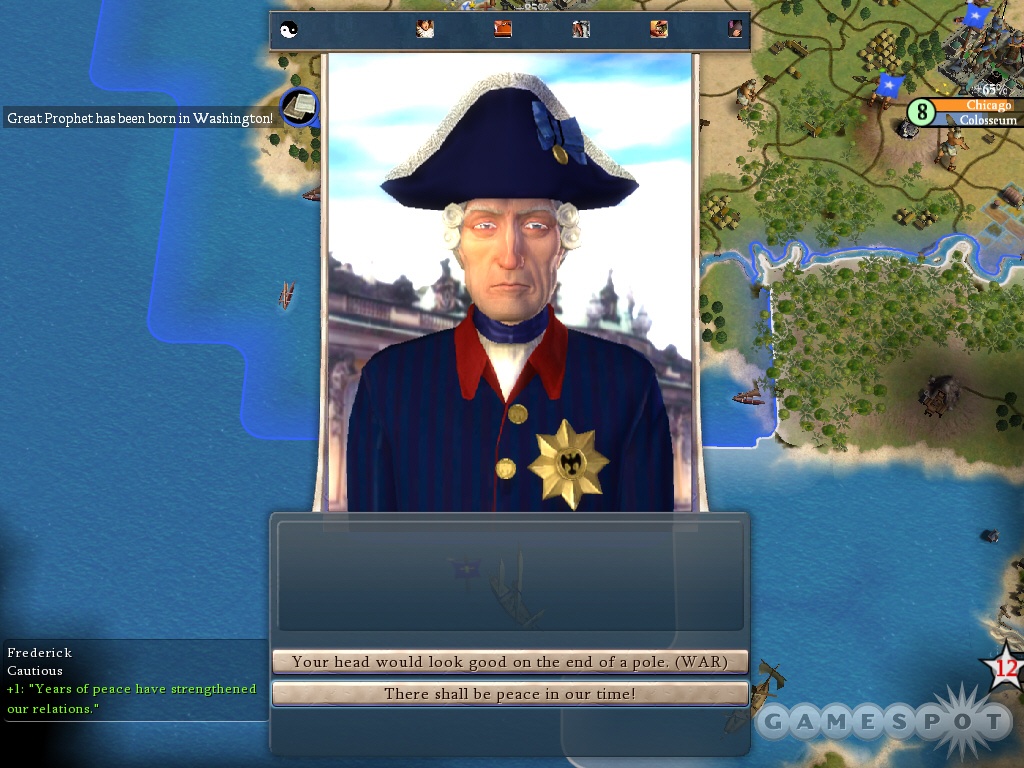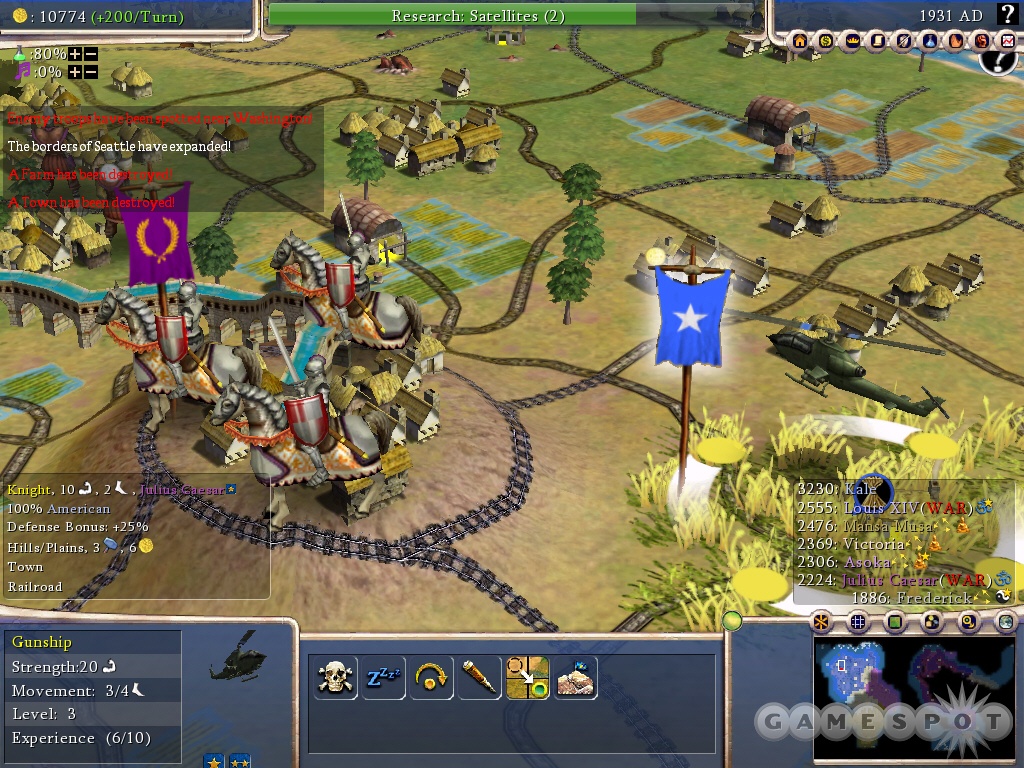Civilization IV World Exclusive Hands-On
It's one of the most anticipated games of the year, and we played the heck out of it.
Contrary to what you may think, it's not every day that we get our hands on one of the most anticipated games of the year...ahead of everyone else on the planet, no less. So when an in-production version of Civilization IV recently arrived in the office, we immediately threw it onto our computers and got to the "hard and difficult work" of breaking down a new Civ. That means we played the epic campaign several times, we expanded our empire through cultural dominance and military conquest (and got our rears handed to us on more than one occasion), and much, much more. And after getting lost in Civ IV, we came away with an excellent sense of how Civ IV differs from its illustrious predecessors.

You may have heard that Civ IV is a big step for the franchise, as it rewrites many of the underlying rules of the series. At the same time, we discovered, it's also a blend of the familiar and beloved turn-based strategy that has made Civilization one of the biggest names in strategy gaming. So where to begin? Well, the beginning is as good as place as any. From the opening menu, the first thing you realize about Civ IV is that this is a much more colorful and livelier Civ than its predecessors, as you're greeted with a cheery melody that feels like it could have been lifted from The Lion King. That's just a hint of what you're in store for, though. You're next launched into the familiar options from previous Civ games. Select a single-player game and you must choose the various parameters of the game, from map style and size, to climate and sea level, to the civilization that you play.
More importantly, you probably want to know what civilizations made the cut. So, without further ado, you can play as the Americans, the Arabians, the Aztecs, the Chinese, the Egyptians, the English, the French, the Germans, the Greeks, the Incans, the Indians, the Japanese, the Malinese, the Mongolians, the Persians, the Romans, the Russians, or the Spanish. Approximately half these civilizations have two possible leaders, which will mainly affect the opposition you encounter, as computer-controlled civilizations will behave differently depending on which leader they get. For example, if you like to play a peaceful, defensive game of Civ, then you'd better worry if Napoleon shows up next door leading the French, because you know he's going to be eyeing your borders like a hungry wolf. Have fun!
Aside from the leader personalities, each civilization has inherent traits that determine whether it veers toward aggressive expansion or, say, peaceful mercantilism. Not to mention that each civilization starts the game with its own set of bonuses and technologies. Unfortunately, the text in the built-in "Civlopedia" wasn't quite finished in the version we played, so we couldn't cull this information. Interestingly, there seem to be a lot more difficulty levels than in previous Civs, and the highest difficult levels are now monarch, emperor, immortal, and deity. If past Civ games are any example, then we can safely guess that these levels should provide a challenge to the most cutthroat of Civ veterans out there, assuming they can adjust to the many new rules, that is.
For the purposes of this preview, we played mainly as the Americans, because as Americans, we're partial to them. But also, the Americans get a cool unique unit late in the game: the Navy SEAL, which replaces the Marine unit, as well as the top-level F-15 fighter jet from Civilization III. Thus, as the Americans, you're dropped into the Stone Age with a settler and an accompanying warrior, and you must begin the long struggle to advance through time. Thankfully, there is a lot of automation built into the game, so the first thing you'll probably want to do is order your warrior or scout to immediately auto-explore the terrain to discover "goody huts" (primitive villages that give you free stuff). Meanwhile, you'll want to settle down and found your first city with your settler. User-friendly is the term for this chapter of Civ, and the game will immediately highlight attractive tiles to establish cities, taking into account nearby resources, terrain features, and proximity to other cities or civilizations.

(We should take this moment to note that the version of the game we played still represents work in progress, so you may notice a graphical glitch or a debugging message in the screenshots. The interface is also undergoing a lot of work. Therefore, don't be alarmed if it looks clunky or cluttered in places, particularly the city screen. Also, the details discussed here are subject to change depending on testing and play balancing, so please keep in mind that the game is still in development.)
Once you've settled down into your first city, the game bends over backward to be user-friendly. Your first task will be to begin research, so you're offered a list of available technologies, with a couple recommended that you choose (though you can always choose your own). Then you'll need to begin building something in your city, and, once again, a list will present you with all your construction options, with two of them recommended. In general, the recommendations are sound, but you may wish to follow your own path for whatever reason. There are also numerous adviser pop-ups that appear during the game that will recommend that you construct a certain building in a particular town, though you can disable these if they become too annoying.
Empire Builder
After your first city is built, one of the first things you'll need to construct is a worker unit, which can construct improvements on the land outside your city. In previous Civs these improvements were limited to a handful (road, farm, and mine), but now there are a plethora of different resources and improvement options at your disposal. For example, you can now build windmills atop hills, watermills on rivers, wineries in vineyards, and much more. It can seem a dizzying array of choices, but thanks to automation, all you have to do is let the artificial intelligence take control of your worker, and it will go about building the best available option on each square, as well as link your cities together by roads. It's such an efficient process, and it improves the pace of the game immensely, since you no longer have to worry about micromanaging all those workers, like you did in previous Civs. 
You also want to make sure to take advantage of the many natural resources in the game. There are more than 30 resources, divided into several categories. Food resources, such as corn, wheat, and clams, play a part in the new city health system. As your cities become bigger, they become unhealthier. One way to combat this is to gain access to different food types, which represent nutritional variety. Each different food resource reduces your unhealthy population by one. Meanwhile, there are luxury resources, such as gold, gems, and silk, and these make your populace happy. Then there are strategic resources, such as oil and aluminum, which let you build certain units, as well as copper and marble, which increase production. There are even esoteric resources, such as Broadway musicals and hit movies, which can make your people happy or that you can trade with other nations.
Next up is the actual empire building, as you need to start establishing new cities and growing the size of your empire. You may get lucky and have an explorer come across a goody hut that gives you an extra settler, but in most cases, you'll need to build a settler at your city and send it out, along with a military escort if you want it to survive an encounter with a wild animal or a barbarian unit. We've found that getting a second city started immediately can be immensely helpful in solidifying a lead against your neighbors, but there's another benefit that we didn't foresee. One of the new concepts in Civ IV is that other civilizations need permission to cross your borders in peacetime, which means that under certain conditions you can fence off your rivals to large portions of the continent, letting you settle it at your leisure. On the flip side, the same thing can be done to you, in which case you may need to negotiate open borders so you can slip your settlers through a rival's territory to get to new land. However, doing so opens you up to another danger: culture flipping.
Culture was a concept that was introduced in Civilization III, and it's still around in Civ IV, though it has been modified quite a bit. Essentially, culture represents "soft power," or the ability of nations to defeat other nations through peaceful means. Think of blue jeans taking down the Soviet Union and you'll begin to get the idea. Culture in Civ IV is important because it expands and determines the sizes of your borders. Build a grand civilization, or one that's at least grander than that of your neighbor, and you'll see your borders expand at the expense of your neighbor's borders. This puts a very strong emphasis on building cultural improvements in your cities, such as libraries and theaters, as the more culture you generate, the better. One particularly nasty tactic in the culture war is to drop what the Firaxis developers like to call the "culture bomb." Basically, if one of your cities creates a great artist unit (which can be randomly generated by building specific great wonders in a city), you can have the artist create a great work in a city, instantly giving it a 2,000-point culture boost. This can have a devastating effect on a rival's border, which then makes it possible to literally isolate cities by shrinking their borders to nothing. In this case, eventually a city will revolt to your side, and you can then take custody of it.
In a number of games we played, we managed to claw our way into the lead but discovered that holding onto it was another issue altogether. Civ IV calculates a running score for each civilization, and this is based on a number of details, such as civilization size, technology, and military power. We discovered that if you leave your civilization lightly defended or equipped with obsolete units, other nations will take advantage of the fact. We tried to play defensive games, where we "turtled" within our borders and built an advanced civilization. Still, we discovered that we needed to maintain a formidable military, if for no other reason than to deter our neighbors from attacking us. This meant upgrading our defenses with walls and castles, as well as upgrading military units whenever a new technology made them obsolete. For example, archers make way for longbows, which make way for muskets, which make way for infantry, and so on. You can upgrade existing military units for a cost in gold, or you can simply construct new ones. It's also important to make sure to build barracks, as they grant new military units an experience level, which allows you to upgrade units when they're created. For example, you can promote a unit by making it a more effective defender, a more powerful attacker, or bestow upon it some other useful trait, such as the ability to heal faster. And, of course, the best defense is a good offense, so you'll also need to maintain mobile and rapid units, such as war elephants, cavalry, and tanks, so you can take the fight to the enemy.

The combat system has undergone a lot of work from previous Civs. The new strength rating goes a long way toward determining the course of a battle. It may sound like a simple idea--the "stronger" a unit, the better its odds--but it's one that has eluded earlier Civs for some reason, as you can hear countless stories about a Stone Age spearmen unit defeating a modern-day tank. In Civ IV, strength goes a long way toward nullifying a lot of those situations, and we saw elite, modern-day Navy SEALs defend a city against waves of less advanced units. (This also made subsequent attacks even more difficult, as all those victories gave the Navy SEALs enough experience points to level up and gain new abilities, such as bonuses for city defense, bonuses against gunpowder units, or a higher strength.) It's still possible to lose, though, especially if the enemy wears you down by sheer attrition, and we expect to hear some grumbling about the combat, though it's still a big improvement over previous Civs.
City Sprawl
One thing that surprised us was just how fast the game flies by. It's hard to state just how much "faster" Civ plays now that you don't have to worry about little details, like micromanaging workers. You also don't have to plunge into the city screen to constantly rearrange the population, like you had to in previous Civs, because unhappiness revolts are a thing of the past. We knew that we were in for a treat during our first game and realized three whole hours had passed in the blink of an eye. It's incredibly easy to get drawn into the game, especially since there are no more transitions from one age to another to mark your progress. You'll start in the Stone Age, and before you know it you're knocking on the door of the industrial age, wondering where the time went. (And this is playing in the default normal mode. Those looking for an even quicker game can play the quick mode, where costs are reduced and there are fewer turns. Conversely, those looking for an even longer game can try epic mode, where the reverse is true.) 
That's not to say that you aren't making any decisions, though. You're constantly making decisions as to what to build in cities or what to research next or where to build a new city. These are higher-level decisions, and they are much more interesting than the repetitious tasks of earlier games, where 90 percent of your commands were to workers telling them to build a road or a farm. You're also making decisions about your government, as well as your religion. Gone are the classic government "archetypes" found in previous Civs, such as democracy, communism, and feudalism. Now there's a civic system that lets you tailor various aspects of society (government, legal, labor, economy, and religion) in a number of ways.
Basically, when you research a certain technology, it may unlock a new civic choice for you, and the game will ask if you wish to adopt it. For example, research communism and you can choose to enact the state property civic, which reduces maintenance costs in relation to distance from your capital, as well as increases food production. Research philosophy and you can adopt pacifism (a religious civic), which doubles your birth rate in cities but increases the support costs for each military unit. Obviously, certain civics are ideal in certain situations. When you're at peace, free markets, emancipation, and representation are the way to go, but if you're in a battle with a cutthroat opponent, you may find yourself wanting to tighten down on civil rights so that you can get lower upkeep costs on your military units. To prevent you from constantly switching civics, there is a slight cost whenever you change, as your society will temporarily slip into anarchy while the revolution is under way.
Religion is undoubtedly one of the riskier new additions in Civ IV, for obvious reasons, and Firaxis is playing it relatively safe. However, since religion has been (and remains) a driving force in human history, its absence could no longer be ignored. There are seven religions in the game (and, if you must know, they are Judaism, Christianity, Islam, Hinduism, Buddhism, Confucianism, and Taoism). As with civics, you unlock new religions when you research certain technologies, and if you're the first civilization to unlock that technology, one of your cities becomes the founding city for that religion. Religion seems to be mainly a force for getting along with your neighbors. That is, if you can export your religion to your neighbors using missionaries, your chances of getting along with them go up. If you want to prevent this, you can adopt certain religious civics, such as theocracy, which halt the spread of non-state religions. You can also adopt organized religion, which boosts construction in cities with the state religion. There is also a free religion civic, which eliminates state religion, adds happiness, and boosts scientific research. Meanwhile, all religions have the same effects in game, so one religion isn't necessarily better than any of the others.
As we noted in the beginning, Civ IV is a much more colorful game than its predecessors. The rest of the music is as colorful and varied as the cheery opening theme, while the sound effects are quite good. Meanwhile, the game earns some extra points in our book, because every time you research a new technology, the grandfatherly voice of Leonard Nimoy (Mr. Spock himself!) kicks in with an appropriate quote from history. Graphically, we must admit the game does take some getting used to, but it does grow on you, particularly in how it feels more alive than previous Civ entries. There are also lots of neat graphical touches, like the fact that if you zoom in close enough on the world map, you can see all the improvements and wonders you've built in a particular city. We also love the way that cities actually "sprawl" out now, as if they're taking over neighboring tiles. Now big cities really "look" like big cities on the map. Meanwhile, as it's developed, the countryside takes on a life of its own, as towns and villages sprout up between cities.

We've easily played hours upon hours of Civ IV since we've gotten our hands on it, and yet we can safely say that this only represents the tip of the iceberg. But that's somehow fitting for a game that encompasses approximately 6,000 years of history. Our sense of Civ IV is that, overall, it's a big improvement for the franchise. Yes, change can be a scary thing, and undoubtedly some changes will upset some people. However, change can also be a good thing, and in many ways, Civ IV feels like both a whole new game and good old Civilization as we know it.
Firaxis will spend the next month finishing the single-player game, and we've learned that some other features will be finished after the game is released. Specifically, the multiplayer pit boss, which will allow persistent multiplayer games of Civ IV, will be released in December. Meanwhile, the software developer kit, which will aid mod makers, will be released in January. While that will undoubtedly create some disappointment, the good news is that the single-player game is looking good thus far, and the game will still ship with an extensive variety of multilpayer modes, including team play, hot join (where the AI takes over if a player drops out), and simultaneous turns. Civilization IV is scheduled to ship at the end of October.
Got a news tip or want to contact us directly? Email news@gamespot.com
Join the conversation